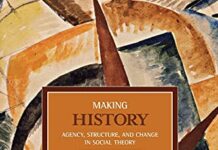
Ebook Info
- Published: 1991
- Number of pages: 224 pages
- Format: PDF
- File Size: 19.11 MB
- Authors: Alex Callinicos
Description
It has become an intellectual commonplace to claim that we have entered the era of ‘post-modernity’. Three themes are embraced in this claim – the poststructuralist critique by Foucault, Derrida and others of the philosophical heritage of the Enlightenment, the supposed impasse of the High Modern art and its replacement by new artistic forms, and the alleged emergence of ‘post-industrial’ societies whose structures are beyond the ken of Marx and other theorists of industrial capitalism. Against Postmodernism takes issue with all these themes. It challenges the idealist irrationalism of poststructuralism. It questions the existence of any radical break separating Post-modern from Modern art. And it denies that recent socio-economic developments represent any fundamental shift from classical patterns of capital accumulation.Drawing on philosophy and cultural history, Against Postmodernism takes issue with some of the most forthright critics of post-modernism – Jurgen Habermas and Frederic Jameson, for example. But it is most distinctive in that it offers a historical reading of these theories. Post-modernism, Alex Callinicos argues, reflects the disappointed revolutionary generation of ’68, and the incorporation of many of its members into the professional and managerial ‘new middle class’. It is best read as a symptom of political frustration and social mobility rather than as a significant intellectual or cultural phenomenon in its own right.
User’s Reviews
Editorial Reviews: Review ‘This book is indeed a pleasure to read.’ Radical Philosophy’Erudite and intelligent study.’ Theory, Culture & Society From the Inside Flap It has become an intellectual commonplace to claim that we have entered the era of ‘post-modernity’. Three themes are embraced in this claim – the poststructuralist critique by Foucault, Derrida and others of the philosophical heritage of the Enlightenment, the supposed impasse of the High Modern art and its replacement by new artistic forms, and the alleged emergence of ‘post-industrial’ societies whose structures are beyond the ken of Marx and other theorists of industrial capitalism. Against Postmodernism takes issue with all these themes. It challenges the idealist irrationalism of poststructuralism. It questions the existence of any radical break separating Post-modern from Modern art. And it denies that recent socio-economic developments represent any fundamental shift from classical patterns of capital accumulation.Drawing on philosophy and cultural history, Against Postmodernism takes issue with some of the most forthright critics of post-modernism – Jurgen Habermas and Frederic Jameson, for example. But it is most distinctive in that it offers a historical reading of these theories. Post-modernism, Alex Callinicos argues, reflects the disappointed revolutionary generation of ’68, and the incorporation of many of its members into the professional and managerial ‘new middle class’. It is best read as a symptom of political frustration and social mobility rather than as a significant intellectual or cultural phenomenon in its own right. From the Back Cover It has become an intellectual commonplace to claim that we have entered the era of ‘post-modernity’. Three themes are embraced in this claim – the poststructuralist critique by Foucault, Derrida and others of the philosophical heritage of the Enlightenment, the supposed impasse of the High Modern art and its replacement by new artistic forms, and the alleged emergence of ‘post-industrial’ societies whose structures are beyond the ken of Marx and other theorists of industrial capitalism. Against Postmodernism takes issue with all these themes. It challenges the idealist irrationalism of poststructuralism. It questions the existence of any radical break separating Post-modern from Modern art. And it denies that recent socio-economic developments represent any fundamental shift from classical patterns of capital accumulation.Drawing on philosophy and cultural history, Against Postmodernism takes issue with some of the most forthright critics of post-modernism – Jurgen Habermas and Frederic Jameson, for example. But it is most distinctive in that it offers a historical reading of these theories. Post-modernism, Alex Callinicos argues, reflects the disappointed revolutionary generation of ’68, and the incorporation of many of its members into the professional and managerial ‘new middle class’. It is best read as a symptom of political frustration and social mobility rather than as a significant intellectual or cultural phenomenon in its own right. About the Author Alex Callinicos is Professor of Politics at the University of York. He has authored many books including Making History (1987). Read more
Reviews from Amazon users which were colected at the time this book was published on the website:
⭐Alex Callinicos is, at heart, a political activist, a revolutionary socialist who is involved with day-to-day organizing. It is this practical work, I think, that makes him such a powerful critic of postmodernism. Without one foot in the real world, nobody could confront such a steaming pile of academic nonsense without sliding into complete irrelevance.Alex starts off with a strong, refreshing judgement:”I do not believe that we live in ‘New Times’, in a ‘postindustrial and postmodern age’… I deny the main theses of poststructuralism, which seem to me in substance false. I doubt very much that Postmodern art represents a qualitative break from the Modernism of the early twentieth century. Moreover, much of what is written in support of the idea that we live in a postmodern epoch seems to me of small calibre intellectually, usually superficial, often ignorant, sometimes incoherent.”But, of course, he has to defend these claims, which (unfortunately) requires delving into the postmodernist babble about “discourse” and “metanarratives.” As a result, this book is a very very difficult read, even for those who are familiar with postmodern theory. In the preface, Callinicos even seems to regret having to follow such a “tortuous path.” But the journey is well worth it, thorns and all, especially for exasperated college students who must grapple with these ideas in their classes.Alex does not boil down all opposing theories to his own viewpoint. In fact, this book points out many of the open questions that remain in philosophy and social theory. In every area, however, postmodernism proves to be a dead end, leading to political inactivity and confused relativism.Rather than simply dismissing these views, Callinicos unearths their historical roots. Postmodernism is not just bad philosophy; it is the reflex of disillusioned intellectuals. When the revolts of the late 60’s and the hopes of Stalinist “socialism” both collapsed, many radical academics retreated to their snail’s shell of empty theory.Alex’s ability to see postmodernism in context comes from his grounding in active, classical Marxism. If you can make it past the thick stew of difficult terms, this book will do more than help you fend off fashionable academic trends. It will also point the way forward to a revolutionary Marxist tradition, where philosophical and political debates do “not take place in discourse but on the terrain of politics itself.”
⭐Alex Callinicos, political philosopher and Marxist-Trotskyist activist, launches a blistering attack against the leading stars in the postmodern, or poststructuralist, trends in recent thought, such as Derrida, Foucault, Deleuze and Lyotard, by regarding their idealist irrationalism as the last decadent gesture of late capitalism. His “symptomatological” critique interprets their efforts to decentre the autonomous, undifferentiated “subject”, or self, in addition to their tepid relativism and their tortuously obscure writing style as signs of a reactionary nihilism on the part of disillusioned, middle-aged bourgeois academics. Central to Callinicos’s analysis were the events surrounding the failure of the student insurrection of Paris ’68, which, in consolidating peacemeal reformism in the form of trade unionism on the one hand, and allowing the Maoist left to emerge triumphant on the other, effectively ruled out any chance of a people’s revolution,leading to the detumescent revolutionary fervour of many intellectuals, which culminated, according to Callinicos, in the “crisis” which he considers the postmodern phenomena. Callinicos also discounts any claim made by postmodernism towards elaborating a coherent or practicable theory of political resistance. He also takes issue with major thinkers in the post-Marxist camp, such as Marcuse, Adorno and Horkheimer, whom he dismisses for their political quietism, even though his critique is greatly indebted to at least one neo-Marxist, Jurgen Habermas, in his urge to continue the project of modernity, in a bid to rewaken the hope of further human emancipation. Callinicos’s broad-ranging critique also leads him to attack the theorists of the post-industrial society, who maintain that classical Marxism is incapable of penetrating the mystified structures of global, or “disorganised capital”, and he rebuts by claiming that there has been no significant change in the methods of capital accumulation since Marx’ day, and that worldwide revolution is still necessary and justified. He also argues that postmodernism does not in any way represent a qualitative break with the Modernism, in terms of literary, aesthetic or architectural styles, but is merely a refinement of it. However, Callinicos’s optimism leads him into a blind-alley, as his findings, compiled in 1989, has been overtaken by events, such as the growth of thw worldwide web (e-commerce, m-commerce) the heightening of globalised capital, the further erosion of nation-state boundaries and the proliferation of the services industry as opposed to manufacture – all which have inaugurated a new phase in capital formation which may elude even Callinicos’s efforts at analysis. Secondly, Callinicos’s negative criitque, though effective at times in pointing out some of the contradictions that bedevil cultural theory, does not offer a clear programme for political action. The only path open to him, of course, is the attempt to establish another “meta-narrative” such as the working-class emancipation, a course that his no become out-of-date subsequent to the colossal failure of communism in the Soviet Union, and the establishment of the Stalinist terror state. By contrast, poststructuralism, with its obsession with the fragment, the paradox and the plural nature of values, seems to occasionally offer a not always positive, but often energetic engagement with, political aporias. Nevertheless, Callinicos’s study contains a wealth of useful information and many interesting observations on the historical, economic, literary and aesthetic trends dominant up to the Modernist impasse, and is supported by extensive quotations and a bibliography. Overall, however, he misses the point, as his analysis is far too partisan and hence, incomplete, to be totally convincing.
⭐The power of this book is that it explains the development of postmodernist theories in relation to the failure of the struggles of the 60’s to overturn capitalism and the subsequent rise of neoliberalism. Callinicos shows that the theories of the leading proponents of postmodernism were not new and were drawn from the nihilism and anti-enlightenment of Nietzsche. Many of the claims made by postmodernists for a new epoch of capitalism were based on no empirical evidence and were simply false. The hallmarks that were supposed to define this new epoch were well established aspects of modernism itself. Most importantly, this book exposes the failure of postmodernism to offer a challenge to capitalism and, as an alternative to this capitulation, Callinicos argues for a an engagement with the many developing contemporary struggles that appear to have passed postmodernism by.This book is worth reading alongside Peter Bürgers, ‘The Theory of the Avant Garde’ and ‘Discourses of Extremity’, Norman Geras devastating critique of Post-Marxism.
Keywords
Free Download Against Postmodernism: A Marxist Critique 1st Edition in PDF format
Against Postmodernism: A Marxist Critique 1st Edition PDF Free Download
Download Against Postmodernism: A Marxist Critique 1st Edition 1991 PDF Free
Against Postmodernism: A Marxist Critique 1st Edition 1991 PDF Free Download
Download Against Postmodernism: A Marxist Critique 1st Edition PDF
Free Download Ebook Against Postmodernism: A Marxist Critique 1st Edition




